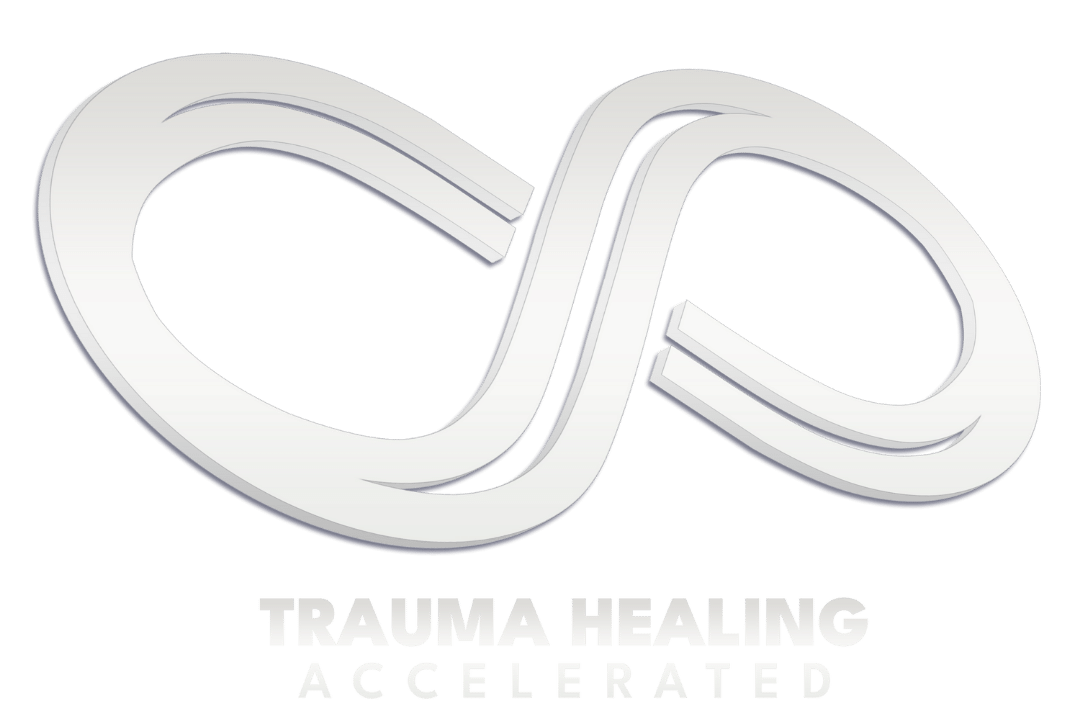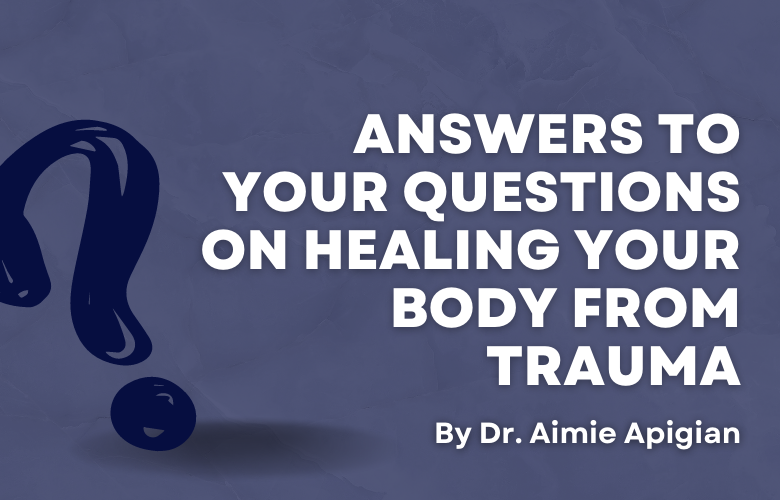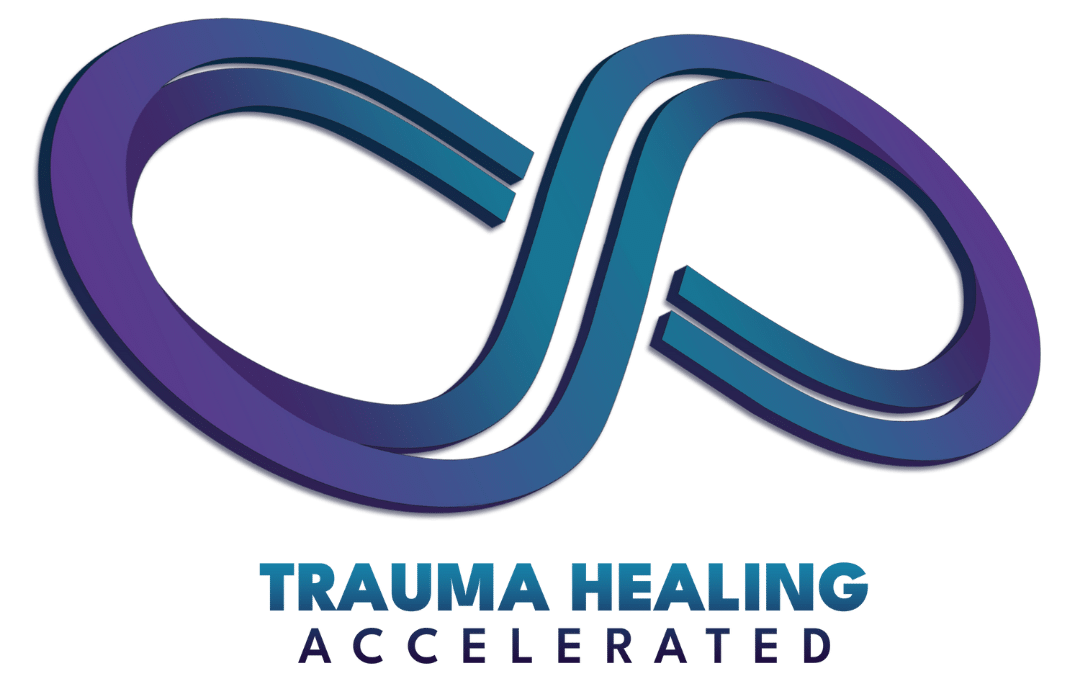Answers to Your Questions on Healing Your Body from Trauma – Many people have sent in questions asking about the various effects that trauma has on our bodies, so today I will share some of these questions and stories with you. There are a variety of stories from individuals, like you, who have shared their personal experiences and symptoms with me. I think you’ll get a lot out of hearing their stories, questions, and answers.
Healing Your Body From Trauma Questions
Jo
Question: Hi Dr. Aimie. Thank you for another interesting post. I have struggled with feeling and showing anger in therapy – my therapist has tried to encourage me to feel or share it but it just doesn’t come. This week I totally froze and couldn’t say a word or look at my therapist for the whole session. I had listened to your video blog recently on why we can’t always feel it and I wondered if I was scared of sharing the anger at her part of me felt. I feel like it’s inside me but too hidden or I’m too scared of it. It’s frustrating. Are there any tips you can share please? Or do I just need to keep working (it’s tough!).
Answer: Hello Jo! Of course you would struggle with anger! I hope you aren’t being critical of yourself for that too! The steps to healing ourselves include (1) awareness (you’ve got that now!) and (2) acceptance, then (3) action. It seems like you want to jump from awareness to action! Lol! Don’t worry, everybody wants and tries to do that at first!
We have to take our time with acceptance, because if we’re frustrated with ourselves, true change and healing will never happen, it will never stick. Only when we change out of love and acceptance for ourselves, does the change feel good and it’ll stick.
So, acceptance is accepting you are this way with no expectations that you will be different. If you “hate” that part of yourself, you just need to spend more time with acceptance until it is actually something that you find endearing as you would a child with a quirky behavior. Then you need to understand how it is you became this way. What was it in your very early environment that made it too dangerous to express anger? How did hiding your anger in the past help you survive your childhood?
Then, we get to be grateful for how it has helped us survive, rather than hate it. Then, the total acceptance comes with no expectations that this will change in the future. It seems counterintuitive that once you have total acceptance of this aspect of yourself with no expectations that it will change, that is when the change can happen in a healing way that will stick.
Action starts very gentle, with changing your self-talk at first. When you see yourself hide anger again, you sort of talk to yourself, and say “I totally get why you are afraid to show anger. You had to in order to survive! And actually, I did survive, and I am in a completely different environment now where it’s safe to express that I am upset. It actually would help me a lot to be able to express anger in a healthy way. In therapy session, I could have (NOT I “should” have) expressed my anger and it would have been totally safe with my therapist. Maybe next time, I can try it out and see how things go. I promise you (the adult self of you now talking to the younger scared part of yourself), that if it does not go well, I will walk out and leave to protect you.”
Those are my tips, Jo. It is hard work to change, but it is a gentle hard work, not a self-critical and forcing yourself to do things you haven’t prepared your little scared girl for yet, if that makes sense.
Learning
Question: I am not a professional nor a parent of someone with trauma. I am that person with trauma. I am in my mid 30’s and just now finally getting the correct help (I was misdiagnosed many times in my life) for my childhood filled with abuse, neglect and abandonment from my parents.
I have an amazing trauma therapist. I couldn’t put into words what I could feel her doing with me, this is it, she is attuning! It makes me feel safer than I ever have.
You wrote “People with a history of trauma feel safer in your strength, because they will only allow themselves to trust and attach to you if they know you’re internally stronger than they are.” In every way, YES! My attachment is anxious avoidant. As much as I want to have people I can attach to, I am not able to do it.
I do have a couple of questions. I also read your blog post about the two levels of attunement; attachment and autonomy. On average how long does that take? I realize that I will not have my therapist forever. One of my biggest fears with her is that I will manage to trust and then she will push me away before I am ready. I don’t want to let go and get attached and then have it ripped away again. My second question is where at my age (35) do you find someone, other than a professional, to attuned with outside of therapy? I would never be comfortable with it being someone that I looked at as a friend. The authority would definitely be important to me. Thanks for your time!
Answer: I am so happy for you that you have found an excellent therapist with whom you feel completely safe! That’s fantastic!
It might be frustrating to you, but I am going to answer your questions from a different perspective.
On average, how long does attachment and autonomy happen? The process of healing our bodies, mind, and souls from insecure attachment is on a continuum that approaches a completely health body and an earned secure attachment. As you progress along this continuum, you will have more moments when you are in connection with yourself and others and feel safe in that authentic connection. As you heal, you will notice yourself feeling better in your body and avoiding will become not only less, but actually uncomfortable. Different events in life that are out of your control will challenge you and may set you back into the pattern of isolating and self-protection. There are so many factors that make for there not being an average time for adults, but seeing progress is the important thing!
Of course with your history of attachment trauma, you would be afraid of being disconnected from your therapist before you are ready! You just voiced the hidden fear of every individual with insecure attachment! The next step in your healing will be for you to become your own loving parent to the younger scared child inside. You will learn how to handle loss and changes in relationships without feeling abandoned and stupid for having let down your guard and attached. As you heal, you will be able to have beautiful shared moments with people, authentically share yourself, feel immense love and care for them, feeling safe in the fact that even if life separates you, you feel blessed and grateful rather than scared and abandoned.
Where do you find someone outside of therapy? The best place to find a safe person to attune with who would also provide a level of authority would be at the 12 step meetings “Adult Children of Alcoholics or Dysfunctional Families.” Part of that program involves getting a sponsor whose role is to be both attuning and provide guidance and accountability. As you heal, you will need less of the authority to feel safe having a true connection. You will sense when that time comes though, and give yourself what it feels it needs to keep taking steps!
The beautiful thing is, when you truly want the healing, life will bring you what you need. I guarantee it! Then you will get to start to trust “life” more and relax into the your place in the world knowing you don’t have to figure everything out on your own. God or the Universe, or life, whatever you want to call it, is there to actually help you.
Olive
Question: I was wondering if shutting down communication with others i.e. listening but not speaking, not joining in conversations, not wanting to make friends (but later feeling cross because isolation was chosen) had anything to so with the dopamine reward system and regulating the nervous system?
Answer: Olive, this is a good question! Shutting down communication is a form of going into the survival freeze response because something in the internal or external environment unconsciously triggered threat. This pattern of going into the freeze state can become a default and automatic response over time, but will set up the pattern in someone’s life of creating isolation and then feeling lonely. It can also be seen through the perspective of one expecting/fearing rejection from others and yet creating an experience of isolation and rejection because they are more comfortable with that than connection and intimacy (classic for insecure attachment).
Anytime you have insecure attachment patterns like this, yes, nervous system dysregulation and dopamine reward system are always a result of attachment trauma.I hope this helps ~ sorry to hear this is something that for whatever reason, you are familiar enough with to describe so well. Thank you for reaching out and asking.
Ani
Question: Hi Dr. Aimie, may I ask you what is the way to stop the freeze response and to release the anger? Mainly what is the way to release yourself from the freeze response. I feel extremely tired and I can’t move, I do it only by my will, is that because of the freeze response? I also don’t have an image of myself and a body image now, maybe that’s the reason? Or maybe the fact that I am at pieces. I mean I don`t feel my body mine, and sometimes I feel like, for example, my left hand is something separate and my right hand is separate.. as if they are not a part of one hole thing. you know what I mean?
Answer: Hello Ani, while an easy question to ask – “How do I release myself from the freeze response?” – it can be a complicated answer because there are a lot of factors.
First of all – what you are experiencing with not feeling your body and feeling like parts are somehow separate is a very common finding. It reflects the dissociation from our body that is a natural part of the freeze response. Especially if we are adults trying to heal from the effects of trauma and the freeze response, it is hard but good and rewarding work. One of the first steps to freeing ourselves from our default freeze response is to come to understand it and cherish it for what it represents: a primal form of survival. It helped you survive things you would not have otherwise survived – becoming aware and grateful for our freeze response starts us on the journey to then be able to release it.
You mention anger. Usually, the freeze response has become our default response to anger. The freeze response is the child’s way of stopping them from acting out in anger towards an adult who could hurt them worse if they expressed the anger. The freeze response is a very effective way of dissociating from those feelings, becoming numb to not only the anger but the tension of having the anger and not expressing it. The cost, of course, is dissociation from other feelings and even parts of our body.
Coming back into our bodies can be a difficult process, and one that is often best done with someone trained in working with the nervous system. One of the best recommendations I have for someone trained in the nervous system is a Somatic Experiencing Practitioner. You can find a listing of those here.
I know this answer barely touches the surface of your question, but I hope this is helpful.
Response: Thank you very much for your answer, Dr. Aimie! I didn’t know these things so it’s definitely useful! This is even maybe the first time someone understands so well what I’m talking about.
Unfortunately here in Bulgaria psychology and psychotherapy are light years away from the things you talk about. For example they tell me I just lack self-confidence although I clearly explain them that I’m not in my body etc. They even don’t think I have trauma when it’s so clear I have such a server one!! I guess they haven’t heard about C-PTSD. And when I ask them – so what we’re gonna do, they tell me – well, we’ll continue talking..! So I very much doubt it there is a Somatic Experiencing Practitioner here :/ I will try to search though.
So, the freeze response is a response to the child’s anger toward the adult to protect the child from the results from this anger that can be far more dangerous than if the child doesn’t express it? The dissociation is a part of the freeze response?
I think in my case there is also lack of identity. I haven’t got an image for myself and body image. I must always ‘see myself’ in someone else. Plus I ‘lose my mind’ – I literally can’t think, can’t talk when things go bad.. my brain isn’t working.. maybe it’s this thing called brain fog.. or it’s because I go back in the trauma that is when i was 3 years old – I have been in a hospital alone..? The ‘other trauma’ are the traumatic relationships with my mother that has always been very aggressive.
Is there a book where I can read something about these things?
And about the anger.. can I do at least SOMETHING to express it, to release a little bit.. for example screaming, alone with myself, or maybe at someone..? or it’s ‘blocked’ from the freeze response and I must first work with it?
Answer: There are a lot of good resources that I think you would really identify with and could bring a lot more awareness and understanding to what is happening in your body. Perhaps the best place to start might be with reading Waking the Tiger by Peter Levine? In this book he really describes the two different trauma response states: sympathetic (fight or flight) and freeze.
The freeze response can be a response to a variety of circumstances. The one quality that is needed for the freeze response to be triggered is for a situation to be “overwhelming.” This is why a freeze response can occur in response to emotional and psychological factors, just as much as physical abuse. Our threat to survival can occur on multiple domains.
Often times people may not even have any memory of an early childhood trauma, but their body and nervous system show that trauma is stored. It sounds like despite what other professionals may be seeing, your brain, body and nervous system show this classic response to stored trauma, including the lack of identity, dissociation, and “crazy-thinking brain.”
Feeling the anger is actually a good sign of healing! While uncomfortable, it can be allowed to surface now, express and release it. This will help with restoring health.
Generally, expressing the anger through physical movement, such as one would do if they were activated sympathetically to fight, will allow the release of the anger from the system. I have found talking and writing more ineffective forms to actually release the anger since it is supposed to move us to physical action for self-protection. The best way to release the anger can be to really try to be aware of what movements your body feels like doing.
Punching, kicking, pushing, biting, and screaming are all ways in which people have allowed expression and release of the anger. In these moments, it is really important to not inhibit yourself or your movements, because just like a child suppressing anger in order to best survive, it will trigger your system to default back into a form of freeze.
I hope this is helpful. This is a journey, not an overnight fix, so be patient with yourself and try to maintain an attitude of curiosity for your body’s responses and stay out of a place of judgment.
I hope these individual’s stories and questions helped with your own questions and struggles. Did you find any of these questions helpful? Do you have more questions?
I enjoy your comments and questions, and look forward to hearing from you.
To Health and Healing ~
Dr. Aimie


